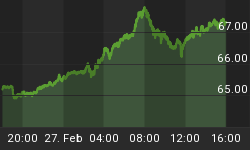In another of his series on Financial Repression, Gordon Long of Market Research and Analytics interviewed Dr. Lacy Hunt, Executive Vice President of Hoisington Investment Management Company.
Previously Lacy Hunt was with the Federal Reserve in Dallas. He was also the chief economist for the largest bank in Philadelphia, and the chief economist for HSBC (at the time the largest bank in the world).
Hoisington manages over $5 billion for pension funds, endowments, insurance companies and others. Hunt has been with Hoisington for 19 years.
Lacy describes financial repression as "a superficial attempt to deal with the excessive indebtedness that grips the global economy, not just the US, but Europe, Japan, the United Kingdom, and even now China and the emerging markets."
"In my opinion will not work," says Hunt.
"Monetary Policy is not the solution here. There are Fiscal Policy solutions but they require shared sacrifice, strong leadership (something we don't have in the US or Europe - no one has).
"Basically what we are trying to do is to solve an extremely over-indebted situation domestically and globally by taking on more debt and aggravating the problem. Rather than bringing us closer to the return of the normal business cycle, they are pushing it all further and further into the future."
2015 Parallels to Currency Wars of 1920s and 1930s
- First, there is a global problem with debt and slow growth, and no country is immune.
- Second, the economic problems now, like then, are more serious and are more apparent outside the United States. However, due to negative income and price effects on our trade balance, foreign problems are transmitting into the U.S. and interacting with underlying structural problems.
- Third, over- indebtedness is rampant today as it was in the 1920s and 1930s.
- Fourth, competitive currency devaluations are taking place today as they did in the earlier period. These are a combination of monetary and/or fiscal policy actions and also, with floating exchange rates, a consequence of shifting assessments of private participants in the markets.
Interest Rates
Regarding interest rates, Lacy says "The downward pressure on global economic growth rates will remain in place in 2015. Therefore record low inflation and interest rates will continue to be made around the world in the new year, as governments utilize policies to spur growth at the expense of other regions."
Three Problem Types of Debt
- Borrowing to finance daily living needs
- Debt that leads to bankruptcy
- Worst type of debt is where excess debt creation inflates asset prices. And that only leads to economic instability.
"Good debt" to Lacy is debt that yields an income stream sufficient to pay back principal and interest.
Deleveraging Not
"The world now has $35 trillion more debt today than in 2007. We are not in the age of deleveraging; We're still in the age of leveraging up. Unfortunately, the overleveraged condition is virtually everywhere in the world."
Thanks to Lacy Hunt for taking the time to share his thoughts.
Mish on Financial Repression
Gordon Long interviewed me on the subject of financial repression in October of 2014.
I describe financial repression as "a set of fiscal and monetary policies for the expressed benefit of the ruling class: politicians, banks, and the already wealthy, at the expense of everyone else."
You can find a synopsis and play the interview here: Gordon Long Video Interview of Mish: Topic - Financial Repression (and How to Defend Yourself From It)
Long also interviewed Dr. Marc Faber. On Long's Financial Repression Website, you can see all the interviews in this series.















